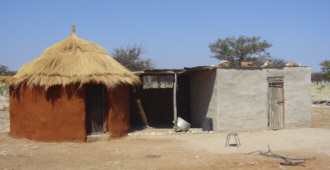Culture and Shared Traditions in Fransfontein, Namibia
To order a printed version of this book at just 6€ send an email to Michael Schnegg.
Note: If
you are using Internet Explorer 7 you may experience some problems with the display
of these pages that have been designed to comply with international standards.

Menue
Foreword
This book is a highly innovative and
courageously fresh approach in the anthropology of Namibia. A project
organised in a mutual effort by professional and experienced
anthropologists from abroad and local activists with a deeply felt and
sincere interest in the inner workings of their own society has
convincingly managed to break new ground. The title “Living
together” is very well chosen. Whereas still most ethnographic
accounts deal with single ethnic communities, here the focus is set on
shared experiences of everyday life. Chapters e.g. on marriage, descent
and food sharing show that many aspects social organisation and culture
are indeed shared between ethnic communities. Damara, Nama and Herero
are one society and in many respects share one culture! The book
challenges anthropologists and urges them to shed more light on the
social and cultural dynamics of sharing across ethnic boundaries in
future. Here anthropology has an important role to play in that it may
deconstruct the agendas of those who play the ‘ethnic card’
for their own selfish ends. This first book of the Fransfontein Oral
History Project powerfully underlines that most aspects of life –
from birth to death so to say – are shared between all
inhabitants of Fransfontein and the wider Fransfontein region. The
project is remarkable in another perspective: it is local people who
describe their livelihoods, their culture, their history; and they do
so in convincing words and in a clear language. In their contributions
they directly address fellow Namibians and probably other citizens of
Fransfontein. There message is clear and powerful: if trees never meet,
people do and have done so for many, many years. There is so much these
people share that even bodies – due to mixed descent – give
evidence of shared lives. All attempts at separating them, is
artificial and strategic.
Prof. Dr. Michael Bollig
Institute of Social Anthropology
University of Cologne
Germany
Prof. Dr. Michael Bollig
Institute of Social Anthropology
University of Cologne
Germany
Designed with Free CSS Templates